Purchasing land for preservation is making the rounds in the region.
A week after Richmond closed on its purchase of Mayo Island, Henrico County announced Wednesday that it’s buying Varina Farms, a 2,100-acre former plantation a few miles downriver, for $17.25 million.
The acquisition follows the county’s purchase last year of the property’s homestead, Varina on the James, which it bought along with 5.6 acres for $1.33 million, bringing Henrico’s total investment in the property to over $18.5 million.
Straddling Interstate 295 on the north end of the Varina-Enon Bridge, the Varina Farms property is nearly twice as large as Wilton Farm, the 1,200-acre tract beside the Pocahontas Parkway bridge that Henrico bought in 2019 for $10 million. The Varina Farms purchase is said to be Henrico’s largest investment in land preservation in the county’s history.
And it’s that county history that prioritized the purchase.
Described as Henrico’s birthplace, the Varina Farms property, also known as Varina Plantation, served as the county’s seat of government from 1632 to 1752, before it was moved to Richmond in Shockoe Bottom and later to its current location on Parham Road.
Before that, the property was the home of John Rolfe and Matoaka, nicknamed Pocahontas, after their marriage at Jamestown in 1614. An image of Pocahontas adorns Henrico’s county seal, and Rolfe is said to have found the Varina location suitable for growing mild tobacco, spawning the tobacco trade that supported the English colony and would later finance the slave trade.
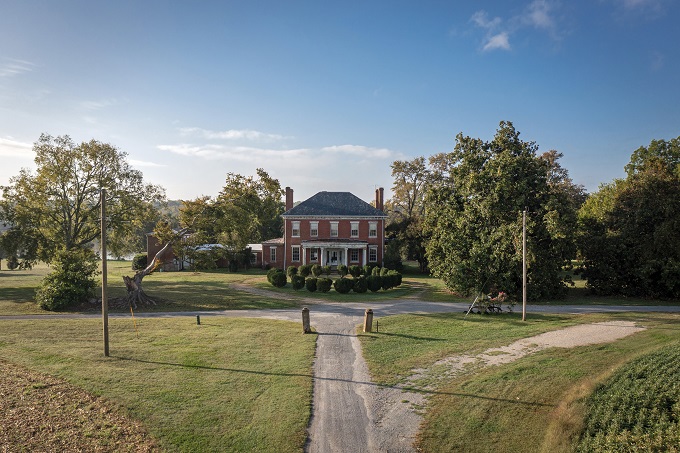
The Classic Revival-style house was built in 1853 and features cosmetic damage from Civil War cannonball fire.
While Henrico’s name is derived from the Citie of Henricus – the second successful English settlement after Jamestown, located across the river in present-day Chesterfield County – the Varina Farms property is where Henrico began, said Tyrone Nelson, who represents the Varina District as chairman of the county’s Board of Supervisors.
“Without exaggeration, Varina Farms represents the birthplace of Henrico County, and it is ground zero for Virginia’s early success and prosperity,” Nelson said in an announcement event held on the property.
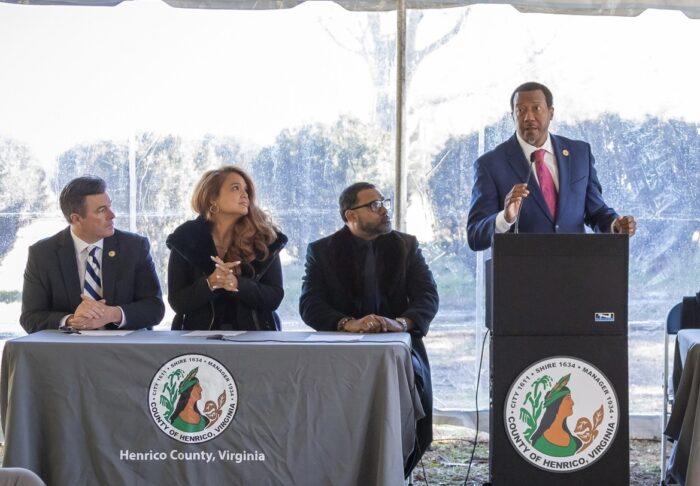
Varina Supervisor Tyrone Nelson speaks at Wednesday’s event alongside fellow supervisors Jody Rogish, Misty Whitehead and Roscoe Cooper, from left.
“Clearly today’s announcement has a lot to do with our history, but in a way, it’s really about securing our future,” he said. “We do value our agricultural heritage and want to do all that we can to preserve it. If any property is worthy of preservation, it is the one that we stand on.”
Other speakers included Wilmer Stoneman III, whose family has owned the property since the early 1900s and were the sellers in the deal. His grandfather, Wilmer Sr., was a county supervisor and served on the School Board, he said.
“This is an emotional day for our family,” Stoneman said, choking up. “It is hard for a family to own a piece of property like this or a business for more than two or three generations. It has been a joy to us for over 100 years, and it has been a source of comfort in sad times. We come here to regenerate, recharge and get back into the game.”
The family’s arrangement with the county allows them to continue using the property – described as half-farmland, half-forestland – for hunting, fishing and other uses for five years. It also allows Engel Family Farms, a Hanover-based operation that has farmed the land since the 1980s, to continue to do so for up to five years.
The Board of Supervisors approved the deal in a special meeting held just before the event. Notice of the meeting was given a week earlier. The meeting included a public hearing in which three speakers asked about the county’s plans for the property.
Nelson replied that those plans will be determined in time but could include opening up the property to school groups and tourists and restoring the 1850s-era house that features cosmetic damage attributed to cannonball strikes during the Civil War.
The property served as a location of prisoner-of-war exchanges during the Civil War and was the site of fighting in 1864 during Union Gen. Benjamin Butler’s advance toward Richmond. It is listed on the National Register of Historic Places and the Virginia Landmarks Register.
“Clearly this property could have been purchased for private use, and as we did with Malvern Hill and Wilton Farm, our focus is on preserving and conserving as much of the property as possible,” Nelson said in the hearing. “As we move forward, we’ll develop teams to figure out what to do, but right now our only intent was to purchase and preserve one of the most historic properties in the United States.”
The Varina Farms property consists of three parcels the family owned through an entity called Varina on the James LP. The parcels are assessed by the county at over $12 million combined.
County Manager John Vithoulkas said supervisors’ desire for the property dates back several years and across different board makeups. He said that discussions with the Stonemans started six or seven years ago, and that last year’s purchase of the house property was meant to show that the county “was serious.”
“The Stoneman family realized that there is no better steward of this property than the county,” Vithoulkas said after the event. “We came from there, so we’re absolutely going to take care of that property.”
Where Henrico has worked with the nonprofit Capital Region Land Conservancy on preserving parts of the 870-acre Malvern Hill Farm in Varina in recent years, Vithoulkas said it was advantageous for the county to go forward with the Varina Farms purchase on its own when the opportunity was presented.
CRLC worked with the City of Richmond on its purchase of Mayo Island for $15 million, half of which was covered by a state grant. The 15-acre island between downtown and Manchester is planned to become part of the city’s James River Park System.
Of the Varina Farms purchase, Vithoulkas said, “Henrico has done really well on the fiscal side, and we have built up the largest reserves in the county’s history, so it was my recommendation to the board that we use $17 million and acquire the most historic piece of property now, and that we do so for these future generations.”
Added Nelson: “You don’t get the opportunity to purchase 2,000 acres of one of the most historic properties in the county, possibly in the nation. This was a once-in-a-lifetime-type thing.”
Purchasing land for preservation is making the rounds in the region.
A week after Richmond closed on its purchase of Mayo Island, Henrico County announced Wednesday that it’s buying Varina Farms, a 2,100-acre former plantation a few miles downriver, for $17.25 million.
The acquisition follows the county’s purchase last year of the property’s homestead, Varina on the James, which it bought along with 5.6 acres for $1.33 million, bringing Henrico’s total investment in the property to over $18.5 million.
Straddling Interstate 295 on the north end of the Varina-Enon Bridge, the Varina Farms property is nearly twice as large as Wilton Farm, the 1,200-acre tract beside the Pocahontas Parkway bridge that Henrico bought in 2019 for $10 million. The Varina Farms purchase is said to be Henrico’s largest investment in land preservation in the county’s history.
And it’s that county history that prioritized the purchase.
Described as Henrico’s birthplace, the Varina Farms property, also known as Varina Plantation, served as the county’s seat of government from 1632 to 1752, before it was moved to Richmond in Shockoe Bottom and later to its current location on Parham Road.
Before that, the property was the home of John Rolfe and Matoaka, nicknamed Pocahontas, after their marriage at Jamestown in 1614. An image of Pocahontas adorns Henrico’s county seal, and Rolfe is said to have found the Varina location suitable for growing mild tobacco, spawning the tobacco trade that supported the English colony and would later finance the slave trade.

The Classic Revival-style house was built in 1853 and features cosmetic damage from Civil War cannonball fire.
While Henrico’s name is derived from the Citie of Henricus – the second successful English settlement after Jamestown, located across the river in present-day Chesterfield County – the Varina Farms property is where Henrico began, said Tyrone Nelson, who represents the Varina District as chairman of the county’s Board of Supervisors.
“Without exaggeration, Varina Farms represents the birthplace of Henrico County, and it is ground zero for Virginia’s early success and prosperity,” Nelson said in an announcement event held on the property.

Varina Supervisor Tyrone Nelson speaks at Wednesday’s event alongside fellow supervisors Jody Rogish, Misty Whitehead and Roscoe Cooper, from left.
“Clearly today’s announcement has a lot to do with our history, but in a way, it’s really about securing our future,” he said. “We do value our agricultural heritage and want to do all that we can to preserve it. If any property is worthy of preservation, it is the one that we stand on.”
Other speakers included Wilmer Stoneman III, whose family has owned the property since the early 1900s and were the sellers in the deal. His grandfather, Wilmer Sr., was a county supervisor and served on the School Board, he said.
“This is an emotional day for our family,” Stoneman said, choking up. “It is hard for a family to own a piece of property like this or a business for more than two or three generations. It has been a joy to us for over 100 years, and it has been a source of comfort in sad times. We come here to regenerate, recharge and get back into the game.”
The family’s arrangement with the county allows them to continue using the property – described as half-farmland, half-forestland – for hunting, fishing and other uses for five years. It also allows Engel Family Farms, a Hanover-based operation that has farmed the land since the 1980s, to continue to do so for up to five years.
The Board of Supervisors approved the deal in a special meeting held just before the event. Notice of the meeting was given a week earlier. The meeting included a public hearing in which three speakers asked about the county’s plans for the property.
Nelson replied that those plans will be determined in time but could include opening up the property to school groups and tourists and restoring the 1850s-era house that features cosmetic damage attributed to cannonball strikes during the Civil War.
The property served as a location of prisoner-of-war exchanges during the Civil War and was the site of fighting in 1864 during Union Gen. Benjamin Butler’s advance toward Richmond. It is listed on the National Register of Historic Places and the Virginia Landmarks Register.
“Clearly this property could have been purchased for private use, and as we did with Malvern Hill and Wilton Farm, our focus is on preserving and conserving as much of the property as possible,” Nelson said in the hearing. “As we move forward, we’ll develop teams to figure out what to do, but right now our only intent was to purchase and preserve one of the most historic properties in the United States.”
The Varina Farms property consists of three parcels the family owned through an entity called Varina on the James LP. The parcels are assessed by the county at over $12 million combined.
County Manager John Vithoulkas said supervisors’ desire for the property dates back several years and across different board makeups. He said that discussions with the Stonemans started six or seven years ago, and that last year’s purchase of the house property was meant to show that the county “was serious.”
“The Stoneman family realized that there is no better steward of this property than the county,” Vithoulkas said after the event. “We came from there, so we’re absolutely going to take care of that property.”
Where Henrico has worked with the nonprofit Capital Region Land Conservancy on preserving parts of the 870-acre Malvern Hill Farm in Varina in recent years, Vithoulkas said it was advantageous for the county to go forward with the Varina Farms purchase on its own when the opportunity was presented.
CRLC worked with the City of Richmond on its purchase of Mayo Island for $15 million, half of which was covered by a state grant. The 15-acre island between downtown and Manchester is planned to become part of the city’s James River Park System.
Of the Varina Farms purchase, Vithoulkas said, “Henrico has done really well on the fiscal side, and we have built up the largest reserves in the county’s history, so it was my recommendation to the board that we use $17 million and acquire the most historic piece of property now, and that we do so for these future generations.”
Added Nelson: “You don’t get the opportunity to purchase 2,000 acres of one of the most historic properties in the county, possibly in the nation. This was a once-in-a-lifetime-type thing.”

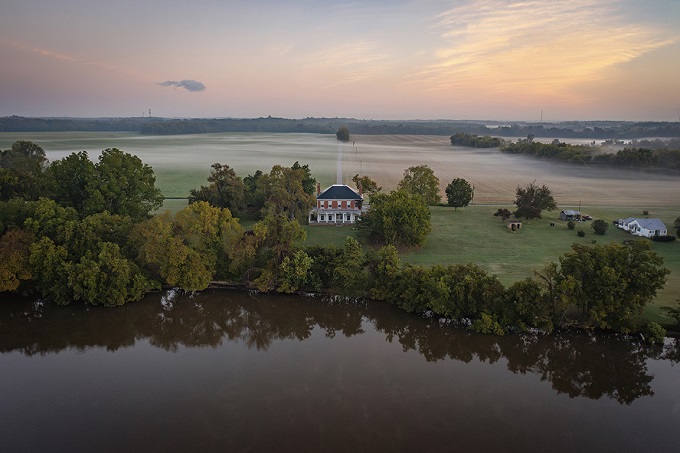
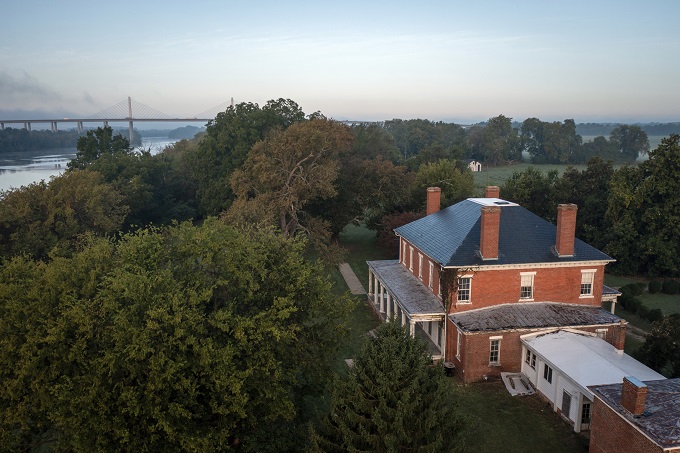
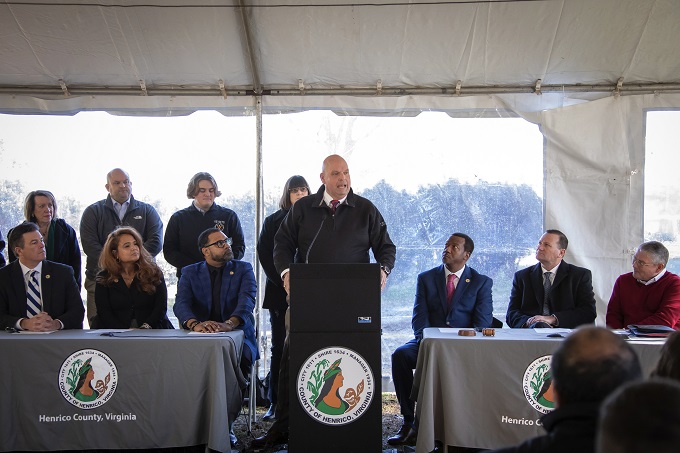
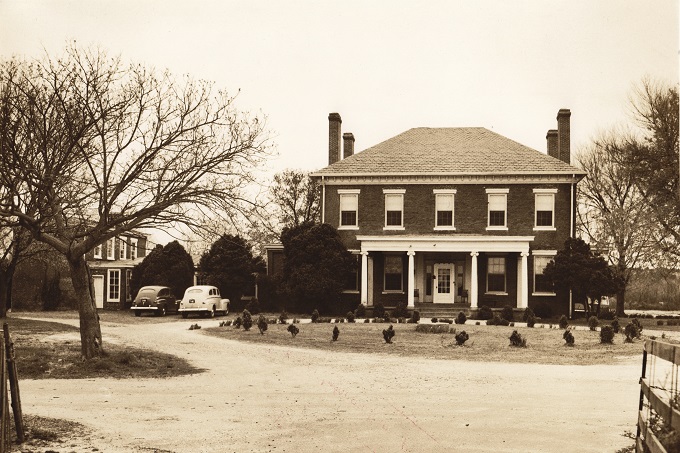


Amazing. Great leadership.
Varina is such a special place.
Fascinating article. Sadly, Pocahontas didn’t get to stay on this beautful property very long after her marriage in 1614. She went to England with John Rolfe in 1616 and died there in 1617. She is buried in Gravesend, close to another great tidal river, the Thames.
Terrific to see this farmland, home, and history being conserved in the midst of all the coming development in Varina. Very forward thinking on the part of Henrico.
I can’t think of a better steward of our nation’s history than the government. Who else can be entrusted to tear a plantation down and pretend it never existed?
Correct,one example is the Monument Ave statues .
Maybe they’ll rename it “Brightpoint Frams”
Henrico is perennially one of the best run counties in the entire nation, If anyone can do it, they can.
I hear they are thinking of buying the City of Richmond and fixing all the problems caused by mismanagement over the past fifty years.
Comment of the month
Great article, Jonathan. It’s heartening to see Henrico County’s commitment to preserving the Varina Farms property, a significant piece of history and natural beauty. The decision to invest over $18.5 million in this acquisition demonstrates a forward-thinking approach that respects both the past and future of the region. It’s not just an investment in land; it’s an investment in the community’s heritage and potential. Kudos to Henrico County for securing this historic property for generations to come!